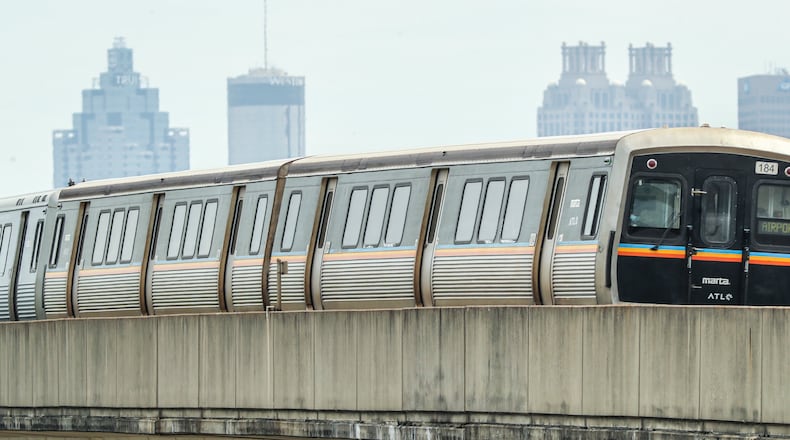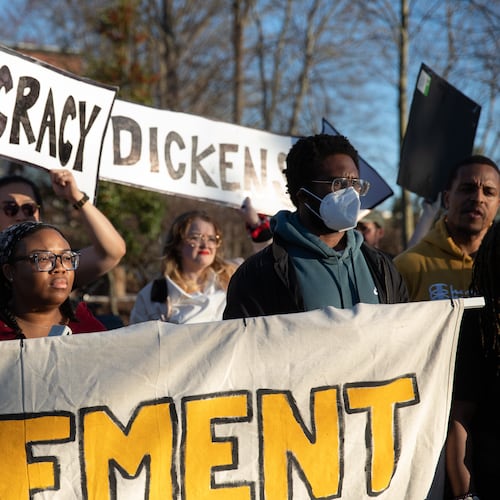The number of Atlanta residents riding the MARTA bus or rail system to get around the city is still not up to the same level as before the COVID-19 pandemic hit the country almost three years ago.
Bus and rail ridership in September of this year is still hovering at around 58% of rail total ridership and 68% of bus total ridership in February 2020. The numbers are steadily climbing back up despite a high number of residents still working remotely, either full-time or on a hybrid schedule.
“Just like any other transit agency across the nation, MARTA is making strides to recover,” MARTA CEO Collie Greenwood told council members last week.
His comments came during the agency’s quarterly presentation where Greenwood provided an update on pending construction projects and answered questions from the transportation committee.
In June of this year, City Council OK’d a $908,000 audit of MARTA’s transit expansion program for the city — a analysis that city officials pushed to learn more about how the transportation body has spent millions of dollars intended to broaden transit options in Atlanta.
Plans to audit MARTA have been gaining steam since the agency announced in March that it was revising its plans for a $2.7 billion Atlanta expansion, but the idea initially received pushback from MARTA officials.
The money for the “More MARTA” expansion program comes from a half-penny transit sales tax that voters approved in 2016. Since 2019, MARTA has spent more than $72.7 million on projects.
Greenwood told council members last week that MARTA has submitted 7,000 pages of documents to auditors with many more thousands to come.
The presentation also put on display the chilly relationship between City Council and MARTA officials. Council member Antonio Lewis, who was presiding over the meeting, suggested the public be allowed to ask MARTA questions — an idea that Greenwood was not on board with.
After taking one resident question, the MARTA CEO said that was “the only time that MARTA will entertain this kind of format.” City lawyers also had issue with opening the meeting for public comment.
“We’re not coming here for an open public forum,” Greenwood said.
---
Credit: Michael Blackshire
Credit: Michael Blackshire
Pedestrian safety advocates are calling for change as the number of pedestrians killed by cars in Atlanta has slowly increased. PropelATL — a nonprofit organization focused on making the city’s streets safer — recently released a report that showed pedestrian deaths are up 23% from 2021. Thirty-eight pedestrians were killed within city limits in 2022 compared to 31 the previous year.
“These deaths are not inevitable “accidents,’” PropelATL Executive Director Rebecca Serna said in a statement. “Instead, they are caused by dangerous street design that makes it easy for cars to speed and hard for people to get to places they need to go safely by foot, wheelchair, or bike.”
The organization’s report, released last month, found 10% of Atlanta’s streets account for 50% of pedestrian-vehicle fatalities as well as a majority of pedestrian-bicycle crashes. More than two-thirds of Atlanta’s 38 fatalities last year occurred in predominantly Black neighborhoods with less pedestrian infrastructure.
---
Isabel Gates Webster Park on the west side of the City may soon have a historical marker honoring one of Atlanta’s first Black female attorneys and Atlanta Municipal Court Judge.
Webster was a practicing attorney for over twenty-seven years, according to legislation, and won numerous awards including 1974 Lawyer of the year, Leadership in the Field of Law and Black Economic Equality, and the NAACP Charles L. Harper Award for community service.
In the 1980′s, former Mayor Andrew J. Young appointed Webster to the City of Atlanta Municipal Court.
Atlanta Attorney Suzy Ockleberry testified to City Council last week and said that Webster paved the way for Black female attorneys to sit on the bench.
“I stand before you today, not just as a friend of the family, but as a Black female,” Ockleberry said. “As a Black female attorney, who was inspired by Judge Webster, to fight for the ability of diverse judges to be appointed to our courts and for diversity attorneys to run for judicial office.”
In 1993, the Atlanta City Council renamed Peyton Forest Park to Isabel Gates Webster Park in her honor.
---
As always — got tips, tricks or just want to say hello? Email me at riley.bunch@ajc.com.
Credit: Miguel Martinez
Credit: Miguel Martinez
About the Author
Keep Reading
The Latest
Featured




